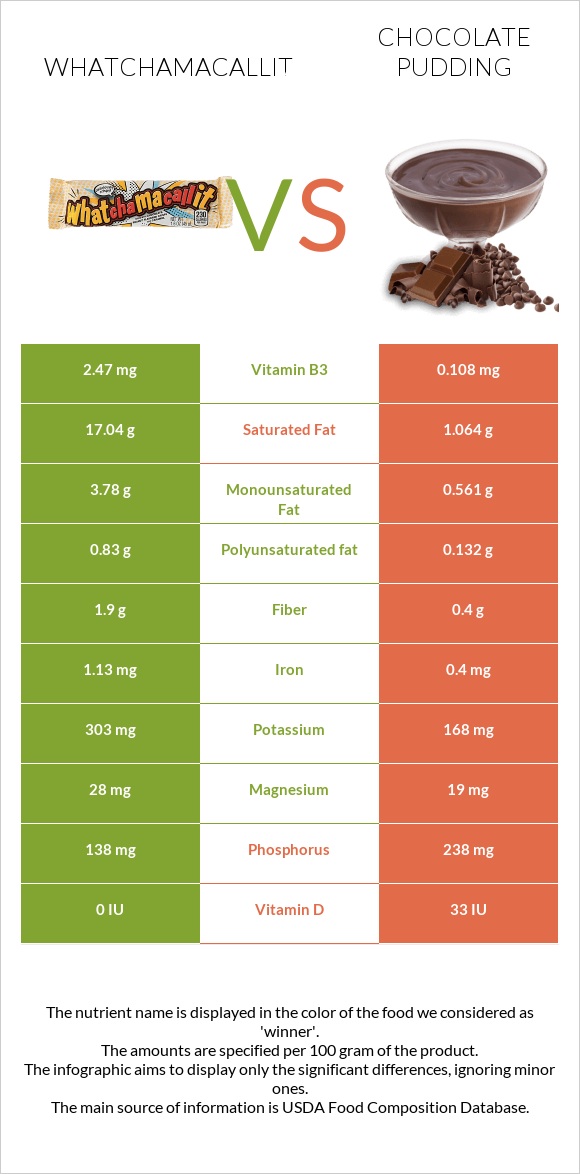Whatchamacallit vs. Chocolate pudding — In-Depth Nutrition Comparison
Compare
A recap on the differences between whatchamacallit and chocolate pudding
- Whatchamacallit has more vitamin B3, manganese, iron, vitamin B1, fiber, and copper; however, chocolate pudding is higher in phosphorus and vitamin D.
- Whatchamacallit covers your daily saturated fat needs 80% more than chocolate pudding.
- Chocolate pudding contains 23 times less vitamin B3 than whatchamacallit. Whatchamacallit contains 2.47mg of vitamin B3, while chocolate pudding contains 0.108mg.
- Chocolate pudding has less saturated fat.
Food varieties used in this article are Candies, WHATCHAMACALLIT Candy Bar and Puddings, chocolate, dry mix, instant, prepared with 2% milk.
Infographic

Infographic link
Mineral Comparison
Mineral comparison score is based on the number of minerals by which one or the other food is richer. The "coverage" charts below show how much of the daily needs can be covered by 300 grams of the food.
| Contains more MagnesiumMagnesium | +47.4% |
| Contains more CalciumCalcium | +13.5% |
| Contains more PotassiumPotassium | +80.4% |
| Contains more IronIron | +182.5% |
| Contains more CopperCopper | +76.5% |
| Contains more ManganeseManganese | +432.3% |
| Contains more PhosphorusPhosphorus | +72.5% |
| Contains more SeleniumSelenium | +228.6% |
Vitamin Comparison
Vitamin comparison score is based on the number of vitamins by which one or the other food is richer. The "coverage" charts below show how much of the daily needs can be covered by 300 grams of the food.
| Contains more Vitamin CVitamin C | +12.5% |
| Contains more Vitamin EVitamin E | +∞% |
| Contains more Vitamin B1Vitamin B1 | +223.5% |
| Contains more Vitamin B2Vitamin B2 | +42.9% |
| Contains more Vitamin B3Vitamin B3 | +2187% |
| Contains more Vitamin B12Vitamin B12 | +19.4% |
| Contains more Vitamin KVitamin K | +∞% |
| Contains more FolateFolate | +260% |
| Contains more Vitamin AVitamin A | +21.1% |
| Contains more Vitamin DVitamin D | +∞% |
All nutrients comparison - raw data values
| Nutrient |  |
 |
DV% diff. |
| Saturated fat | 17.04g | 1.064g | 73% |
| Fats | 23.68g | 1.92g | 33% |
| Calories | 494kcal | 105kcal | 19% |
| Carbs | 63.23g | 18.89g | 15% |
| Vitamin B3 | 2.47mg | 0.108mg | 15% |
| Phosphorus | 138mg | 238mg | 14% |
| Manganese | 0.33mg | 0.062mg | 12% |
| Protein | 8.04g | 3.15g | 10% |
| Iron | 1.13mg | 0.4mg | 9% |
| Vitamin E | 1.27mg | 8% | |
| Monounsaturated fat | 3.78g | 0.561g | 8% |
| Fiber | 1.9g | 0.4g | 6% |
| Copper | 0.12mg | 0.068mg | 6% |
| Vitamin B1 | 0.11mg | 0.034mg | 6% |
| Vitamin B2 | 0.21mg | 0.147mg | 5% |
| Choline | 25mg | 5% | |
| Polyunsaturated fat | 0.83g | 0.132g | 5% |
| Vitamin D | 0 IU | 33 IU | 4% |
| Potassium | 303mg | 168mg | 4% |
| Vitamin D | 0µg | 0.8µg | 4% |
| Vitamin K | 4.3µg | 4% | |
| Selenium | 0.7µg | 2.3µg | 3% |
| Vitamin B12 | 0.37µg | 0.31µg | 3% |
| Folate | 18µg | 5µg | 3% |
| Cholesterol | 12mg | 6mg | 2% |
| Magnesium | 28mg | 19mg | 2% |
| Caffeine | 10mg | 1mg | 2% |
| Calcium | 118mg | 104mg | 1% |
| Sodium | 299mg | 284mg | 1% |
| Vitamin A | 38µg | 46µg | 1% |
| Vitamin C | 0.9mg | 0.8mg | 0% |
| Net carbs | 61.33g | 18.49g | N/A |
| Sugar | 48.86g | N/A | |
| Zinc | 0.43mg | 0.43mg | 0% |
| Vitamin B5 | 0.26mg | 0.274mg | 0% |
| Vitamin B6 | 0.04mg | 0.038mg | 0% |
| Trans fat | 0.12g | N/A | |
| Tryptophan | 0.044mg | 0% | |
| Threonine | 0.139mg | 0% | |
| Isoleucine | 0.182mg | 0% | |
| Leucine | 0.295mg | 0% | |
| Lysine | 0.239mg | 0% | |
| Methionine | 0.074mg | 0% | |
| Phenylalanine | 0.151mg | 0% | |
| Valine | 0.208mg | 0% | |
| Histidine | 0.082mg | 0% |
Macronutrient Comparison
Macronutrient breakdown side-by-side comparison
Protein:
8.04 g
Fats:
23.68 g
Carbs:
63.23 g
Water:
3.04 g
Other:
2.01 g
Protein:
3.15 g
Fats:
1.92 g
Carbs:
18.89 g
Water:
74.59 g
Other:
1.45 g
| Contains more ProteinProtein | +155.2% |
| Contains more FatsFats | +1133.3% |
| Contains more CarbsCarbs | +234.7% |
| Contains more OtherOther | +38.6% |
| Contains more WaterWater | +2353.6% |
Fat Type Comparison
Fat type breakdown side-by-side comparison
Saturated fat:
Sat. Fat
17.04 g
Monounsaturated fat:
Mono. Fat
3.78 g
Polyunsaturated fat:
Poly. Fat
0.83 g
Saturated fat:
Sat. Fat
1.064 g
Monounsaturated fat:
Mono. Fat
0.561 g
Polyunsaturated fat:
Poly. Fat
0.132 g
| Contains more Mono. FatMonounsaturated fat | +573.8% |
| Contains more Poly. FatPolyunsaturated fat | +528.8% |
| Contains less Sat. FatSaturated fat | -93.8% |





